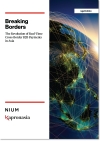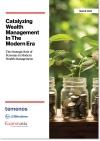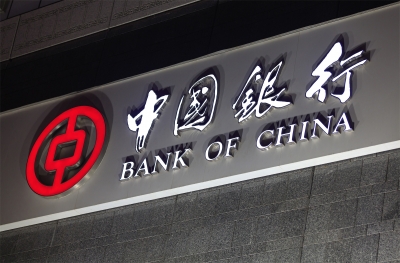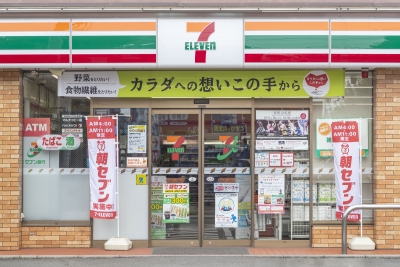Latest Insight
- Why an expected APAC fintech consolidation wave has yet to come
- Why cash is still prevalent in Asia
- Japan steps up green finance efforts
- South Korea charts middle path on crypto
- Should Grab and GoTo merge?
- Singapore pushes ahead with fintech-driven sustainability
- Digital banks in South Korea continue to thrive
- Billease is the rare profitable BNPL firm
- Fintech sector in Pakistan faces mounting challenges
- Where digital banks in Asia can make a difference
Latest Reports
-
Breaking Borders
 Despite progress in payment systems, the absence of a unified, cross-border Real-Time Payments (RTP) network means that intermediaries play a crucial role in facilitating connectivity. This report examines the ongoing complexities, challenges, and initiatives in creating a seamless payment landscape across Asia. Innovate to Elevate
Despite progress in payment systems, the absence of a unified, cross-border Real-Time Payments (RTP) network means that intermediaries play a crucial role in facilitating connectivity. This report examines the ongoing complexities, challenges, and initiatives in creating a seamless payment landscape across Asia. Innovate to Elevate In the dynamic and diverse financial landscape of the Asia-Pacific (APAC) region, banks are at a pivotal juncture, facing the twin imperatives of innovation and resilience to meet evolving consumer expectations and navigate digital disruption. Catalyzing Wealth Management In The Modern Era
In the dynamic and diverse financial landscape of the Asia-Pacific (APAC) region, banks are at a pivotal juncture, facing the twin imperatives of innovation and resilience to meet evolving consumer expectations and navigate digital disruption. Catalyzing Wealth Management In The Modern Era Hyper-personalized wealth management presents a paradigm shift from traditional models relying on static, generalized segments. Developing tailored investor personas based on psychographics, behaviours and fluid financial goals enables financial institutions to deliver rich and tailored customer experiences that resonate with next-generation priorities.
Hyper-personalized wealth management presents a paradigm shift from traditional models relying on static, generalized segments. Developing tailored investor personas based on psychographics, behaviours and fluid financial goals enables financial institutions to deliver rich and tailored customer experiences that resonate with next-generation priorities.
Events
| October 21, 2024 - October 24, 2024 Sibos Beijing |
| November 06, 2024 - November 08, 2024 Singapore Fintech Festival |
The cryptocurrency winter is getting frostier, but a blockchain spring may be around the corner in South Korea. Seoul's prudent approach to distributed ledger technology - less draconian than Beijing's but stricter than Tokyo's - just may represent the happy middle ground. A year ago, Seoul moved to ban anonymous virtual currency trading in a bid to quash crypto related crime, but stopped short of shutting down exchanges as China has done. Meanwhile, although Japan has also banned anonymous trading, it allows crypto to self-regulate, for better or worse.
Germany is pressing China to follow through on nearly two-decade-old promises to open its financial sector to foreign competition. In a January 18 dialogue in Beijing, the two countries vowed to open their respective markets wider to each other's banks and insurers. Reportedly, Beijing and Berlin signed three agreements: one between the two central banks, one regarding cooperation in securities and futures trading, and one to examine banking regulations together.
Mobile payment adoption is accelerating in Thailand as the finance sector moves to digitize. Like its Asean peers, Thailand is keen to use digital finance to boost an underdeveloped banking sector. Without the entrenched incumbents of developed economies, Asean countries tend to view digital finance as a greater opportunity than threat. Even highly advanced Singapore has embraced fintech, with an eye towards becoming Southeast Asia's fintech hub.
In 2018, Chinese banks lent a record $2.4 trillion in loans. That the credit spigot opened is no surprise: The banks had the full backing of Beijing, who looked on nervously as the Chinese economy limped - by its standards, anyway - to the finish line with just 6.5% annual growth, its worst performance since 1990. It wasn't so long ago that China could expect 9% annual growth.
The crypto community is aghast at Beijing's move to regulate blockchain, which will be effective February 15. "Blockchain under threat in China," proclaimed Coingape in January 14. report. The Invest in Blockchain site said that "the Chinese blockchain industry is about to come under heavy scrutiny" in a Jan. 13 article.
With its underdeveloped banking sector, Vietnam is a prime market for digital financial services. Thus far the pace of development has been modest, but analysts expect it will speed up considerably in the next few years. In a November report, ratings agency Moody's said that startups focused on payments were the most prevalent in the nascent Vietnam fintech segment. By some estimates, payments startups account for almost 50% of Vietnam's fintech firms. Vietnam also has about 25 fintech incubators, accelerators and innovation labs.
In Japan, cash is still king. Indeed, the Japanese have a fondness for physical currency that has ebbed amongst their neighbors. Cash accounts for 80% of transactions in Japan, compared to 40% in China and 10% in South Korea.
The United States is not the only major economic power turning cold on Chinese investment. Now the European Union, China's largest trading partner, is having second thoughts of its own about allowing China to buy up its prime manufacturing and high-tech assets. Concern amongst the EU's heavyweights, including Germany, France and the United Kingdom, is significant, analysts say. While weaker states in the EU, notably Greece, continue to welcome Chinese investment, they are increasingly in the minority.
All things considered, the U.S. and China had amicable trade discussions this week. With the clock ticking on the 90-day trade-war ceasefire, both sides have impetus to resolve the trade tiff. The Chinese economy likely grew at its slowest pace in 30 years - 6.5% - in 2018 as U.S. tariffs battered exports. The U.S. economy remains resilient for now, but U.S. President Donald Trump is watching the mercurial stock market nervously. People close to the administration say that he hopes to reach a trade deal with China to rally investors.
At first blush, Didi Chuxing doesn't seem in dire need of a new business model. As China's top ride-hailing app, the Beijing-based firm boasts more than half a billion users and millions of drivers. Granted, it has been burning money for years, but that's par for the course among unicorns - tech startups valued at US$1 billion or more - and some analysts believe Didi could raise up to US$80 billion in an expected 2019 IPO.
More...
China's major banks are moving to open wealth-management units following a regulatory overhaul designed to strengthen risk management and oversight of fund flows in the Chinese financial system. The new rules allow bank subsidiaries to invest up to 35% of a product's net assets in "non-standard credit assets," i.e.: "off-balance-sheet loans.
Years ago, traditional POS machines only provided basic processing that were more convenient than cash transactions, but provided little help when it came to sales analysis. Smart POS started gaining traction in 2014 and grew rapidly as merchants juggled many different payment channels. A smart POS can process QR code, bank card, Quick Pass, as well as analyze business data, maintain membership details and combine online–offline sales. In December, UnionPay and Alipay both launched new acquiring products.
Double 11, the biggest e-commerce shopping festival, had another amazing result in 2018. On November 11th 2018, total online sales in China reached RMB314.2 billion (USD45.2 billion) in one single day.
In an interim report released last month Australia's Banking Royal Commission has highlighted the misconduct, greed, and even criminality involved in the Australian financial services industry. Set up in December 2017, the commission has worked through over 700,000 documents to investigate the dealings of some of Australia’s largest financial companies. The commission has heard from victims and cross-examined some of the key figures in the industry. The results are damning and are likely to spark much greater support for tougher regulation on the banks in the future. However, a battered, bruised, and riskless financial system is no good to anyone and may end up causing further disruption to the economy. It’s important that the government finds the right balance.
China's bank card market is large. Over 9 billion domestic payment cards will be in use by the end of 2018, a nearly 35% increase from the 6.7 billion in 2016. Even though the market is replete with card providers, the clearing business has been always dominated by the only one licensed clearing institution, China UnionPay (CUP), for both domestic and cross-border RMB transactions. That is, until now.








